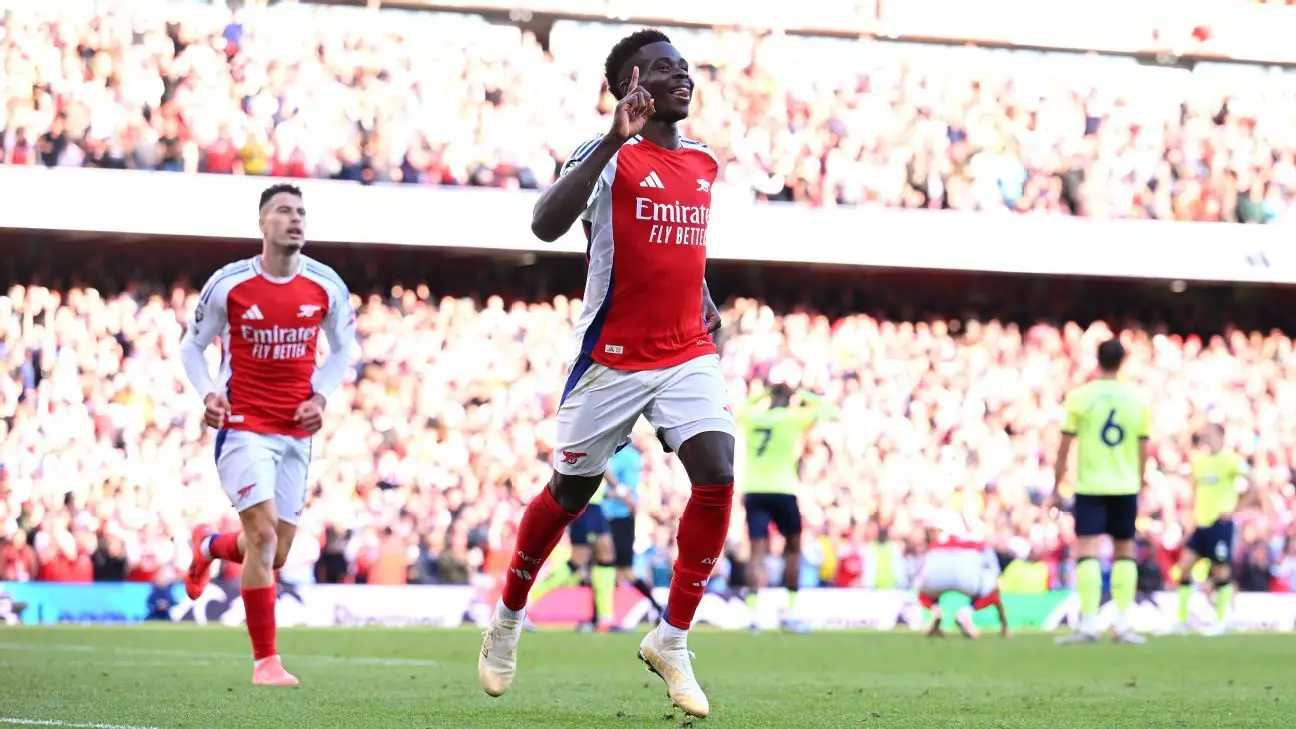Arsenal continued their impressive form in the Premier League with a commanding 3-1 victory over Southampton at the Emirates Stadium. The match marked their fourth consecutive win across all competitions, positioning them closely behind league leaders Liverpool and Manchester City. While the victory appeared straightforward on the surface, a deeper inspection reveals nuances and dynamics that contributed to the outcome.
The initial stages of the match showcased Arsenal’s intention to dominate, as they unleashed a flurry of pressure against Southampton. Corner kicks and aggressive pressing characterized their approach, but the Gunners struggled to convert these opportunities into clear-cut chances. Instead, it was Southampton who drew first blood, turning Arsenal’s momentary dominance into a counter-attacking goal. Cameron Archer’s fine finish from a swift transition highlighted Arsenal’s vulnerability at the back, raising questions about their defensive solidity in critical moments.
As the first half progressed, Southampton managed to weather the early storm, demonstrating resilience despite being on the back foot for prolonged periods. After going a goal down, Arsenal showed commendable spirit by quickly regrouping. Bukayo Saka’s tenacity proved pivotal as he recaptured possession and delivered a precise assist to Kai Havertz, who equalized with a powerful shot that left the Southampton keeper with no chance. This swift response underscored Arsenal’s ability to counteract adversity, setting a tone for the rest of the match.
Following the halftime break, Arsenal emerged with renewed vigor and intent. Mikel Arteta’s strategic decisions, particularly the triple substitution, bore fruit almost immediately. Gabriel Martinelli, who had been on the pitch for a mere ten minutes, found himself in the right place at the right time, finishing expertly off a Saka pass to give Arsenal a 2-1 lead. This tactical flair and the effective use of substitutes highlighted Arteta’s managerial acumen, demonstrating a willingness to adapt and innovate during matches.
Bukayo Saka’s performance was particularly noteworthy, as he proved instrumental in not only creating chances but also delivering the final blow with a goal in the dying moments. His contributions illustrated the level of maturity and skill he has developed, making him a critical asset for Arsenal, especially during Martin Ødegaard’s absence. Saka’s dual role as both a playmaker and scorer showcased his versatility, helping to maintain Arsenal’s bid for the title as they approached the international break.
Defensive Concerns: Room for Improvement
However, while Arsenal celebrated their victory, defensive issues remained evident throughout the match. Despite the scoreboard favoring them, Arsenal occasionally appeared disorganized at the back, allowing Southampton glimpses of opportunity. The goal conceded to Archer was a stark reminder that more stringent defensive discipline is necessary to compete with top-tier teams. There were moments when their consolidated defensive structure wavered, especially when facing Southampton’s quick transitions. These lapses could prove costly against stronger opponents in future fixtures.
Key players like Gabriel Magalhães and William Saliba exhibited a mixture of solid defending interspersed with moments requiring greater assertiveness. Their performances prompted reflection on the need for consistent concentration and cohesion among the backline.
Individually, the performances varied, with a few players stepping into the spotlight. Kai Havertz earned a commendable rating following his crucial equalizer and impact moving forward. His ability to link play demonstrated an emerging understanding with his teammates, crucial for Arsenal’s attacking style. In contrast, Raheem Sterling’s underwhelming performance raised questions about his decision-making and defensive responsibilities, particularly in light of his role in Southampton’s opening goal.
The managerial ratings also warrant analysis; Mikel Arteta’s tactical decisions and player management were instrumental in the comeback. His ability to adapt swiftly underlined the burgeoning tactical depth of his squad, and the positive impact of his substitutions suggests a growing confidence in squad rotation.
Arsenal’s 3-1 victory over Southampton adds crucial points to their tally and reinforces their strong standing in the Premier League. Nevertheless, the match illuminated both strengths and weaknesses within the squad. Acknowledging the defensive lapses and inconsistency will be vital as they move forward. As they prepare for the upcoming fixtures, improving defensive resilience while harnessing their attacking flair will be essential for challenging the league’s elite. The Gunners, while buoyed by a positive trajectory, must strive for a more cohesive and robust tactical identity that can withstand the challenges ahead.

